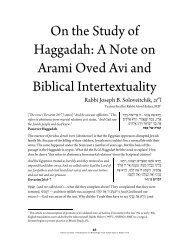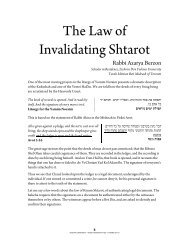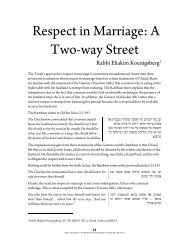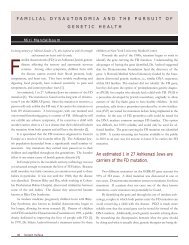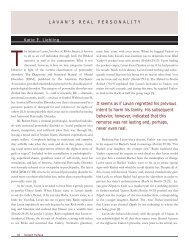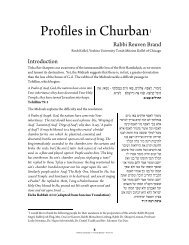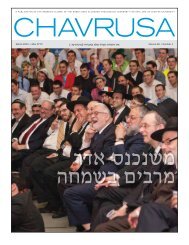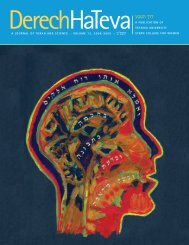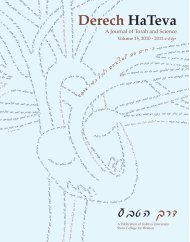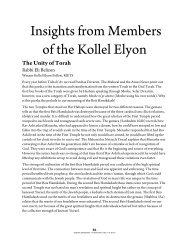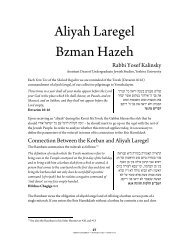Create successful ePaper yourself
Turn your PDF publications into a flip-book with our unique Google optimized e-Paper software.
e suggested, then, that Chapters 1 and 3 actually represent the narrative context for Chapter 2.<br />
In Neviim, we are often given biographical information that gives us insight into the prophet<br />
himself. We thus read, for example, of Yirmiyahu’s abuse at the hands of the people, and of<br />
Amos’s confrontation with priest at Beit El. If we accept Rashi’s approach that Chapters 1 and 3<br />
are expressions of ruach hakodesh and thus represent a Divinely inspired outpouring of the<br />
prophet’s inner thoughts and feelings, we do indeed know a lot more about Habakkuk than we<br />
first supposed. Those chapters serve as a window into the personality of this man, this prophet,<br />
whose prophetic message is in Chapter 2.<br />
Habakkuk was a man of moral passion. He was a master rhetorician and a poet, who had a close<br />
relationship with God, and who questioned God harshly and with intensity. But he was a man<br />
who accepted God’s will and who in the end humbled himself before God. He admitted his own<br />
humanity and through this experience, he offers a message of hope in times of bitter despair.<br />
The essence of the book is certainly the prophecy given by God in Chapter 2 that evil nations<br />
will not rule forever and that God is indeed controlling the big picture of history. The book is<br />
thus rightly found in Neviim. The rest of the work is simply the narrative context and insight into<br />
the man called Habakkuk, who struggled with the same issues which many human beings<br />
struggle with when they look at the world, and in the end he reaches a conclusion based on<br />
God’s words. It is this message, that one can come to terms with difficulties through a proper<br />
understanding of God’s words and actually rejoice, with which God and Habakkuk leave us. It is<br />
this message which the rabbis chose for us to read every year as we reaffirm our covenant with<br />
God on Shavuot.<br />
Yet I will rejoice in the Lord, I will exult in the God of my<br />
salvation. God, the Lord, is my strength, and He makes my feet<br />
like hinds' feet, and He directs me to walk upon my high<br />
places. For the Leader. With my string-music.<br />
Habakkuk 3:18-19<br />
57<br />
YESHIVA UNIVERSITY • SHAVUOT TO-GO • SIVAN 5771<br />
: יעשי יהלאב הליגא הזולעא ‘ הב<br />
ינאו<br />
לעו תוליאכ ילגר םשיו יליח ינדא 'ה<br />
: יתוניגנב חצנמל ינכרדי יתומב<br />
טי-חי:<br />
ג קוקבח



